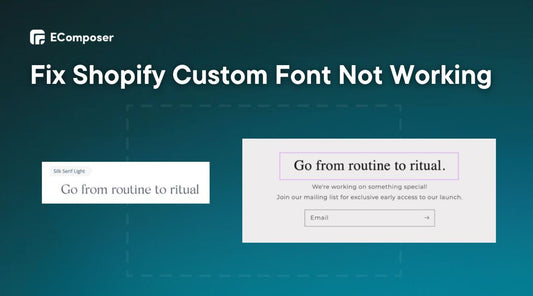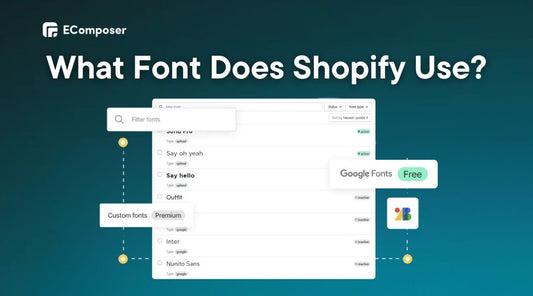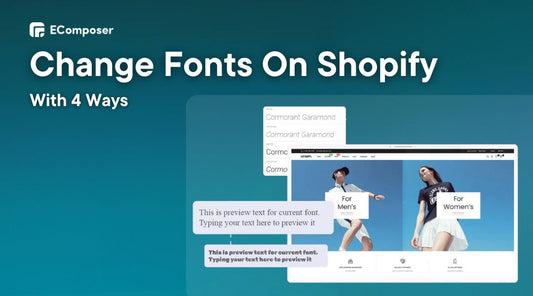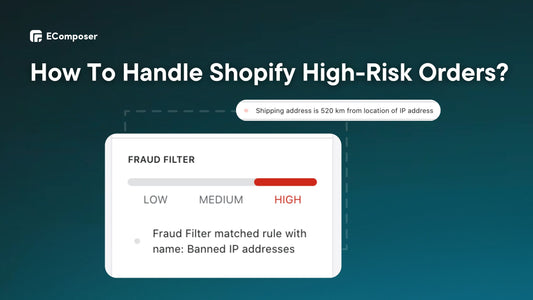10+ Best Shopify Analytics Tools for Store Analysis in 2024

Table Of Contents
Dive into our blog to discover the top Shopify Analytics Tools of 2024, essential for propelling your eCommerce venture. With in-depth reviews and real-time updates, stay ahead in the competitive market. Explore these powerful tools, leveraging data-driven insights to enhance your Shopify store's performance. Stay tuned!
What are Shopify Analytic Tools?

Shopify Analytics Tools are specialized software and applications that provide detailed insights and data analysis for Shopify eCommerce stores. These tools help merchants track and understand various aspects of their online business performance. Key features include sales analytics, customer behavior analysis, inventory management, and marketing campaign effectiveness.
Shopify Analytics Tools enable businesses to make informed decisions, optimize strategies, and enhance overall operational efficiency. Popular examples include Google Analytics for Shopify, and Metrilo, each offering unique capabilities tailored to help merchants extract valuable information from their Shopify store data.
Why do you need Shopify Analytic Tools?

Performance Evaluation
Shopify Analytics Tools offer a comprehensive overview of your store's performance, allowing you to assess key metrics such as sales, conversion rates, and customer acquisition.
Customer Insights
Gain a deeper understanding of customer behavior, preferences, and demographics. This information helps tailor marketing strategies and improve the overall shopping experience.
Inventory Management
Effectively manage inventory levels by tracking product popularity, identifying slow-moving items, and ensuring timely restocking. This prevents overstocking or stockouts, optimizing cash flow.
Marketing Effectiveness
Evaluate the success of marketing campaigns by analyzing traffic sources, conversion rates, and the return on investment (ROI). This insight aids in refining and targeting future marketing efforts.
Conversion Rate Optimization
Identify bottlenecks in the sales funnel and understand where visitors drop off. Shopify Analytics Tools provide insights into user interactions, enabling you to optimize your website for higher conversion rates.
Personalized Customer Engagement
Utilize data-driven insights to create personalized customer experiences. Tailor promotions, product recommendations, and communication-based on customer preferences, enhancing engagement and loyalty.
Competitive Edge
Stay ahead of the competition by leveraging insights from Shopify Analytics Tools. Understanding market trends and customer behavior gives you a strategic advantage in the dynamic eCommerce landscape.
Data-Driven Decision-Making
Shopify Analytics Tools empower informed decision-making based on real-time data. Whether adjusting pricing, expanding product offerings, or refining marketing strategies, decisions are backed by actionable insights.
In summary, Shopify Analytics Tools are indispensable for eCommerce businesses, providing a holistic view of operations, enhancing customer experiences, and guiding strategic decisions for sustainable growth and success.
Best Shopify Analytic Tools - Features, Price, Pros & Cons
1. Shopify Analytics

Shopify's analytics and reporting enable users to examine recent store activities, gain insights into visitor behavior, assess online store speed, and scrutinize transaction data. The Analytics and Reports pages are accessible to all users.
Highlight Features
- Sales Overview: Shopify Analytics provides a comprehensive sales overview, allowing merchants to track and analyze their store's performance. This includes insights into total sales, top-selling products, and sales trends over different periods.
- Customer Behavior Analysis: Merchants can gain valuable insights into customer behavior through Shopify Analytics. This includes data on new versus returning customers, customer demographics, and purchasing patterns. Understanding customer behavior is crucial for targeted marketing strategies.
- Traffic Sources Tracking: The platform offers tools to monitor and analyze traffic sources to your online store. Merchants can identify where their website traffic is coming from, helping them assess the effectiveness of marketing channels and optimize their strategies accordingly.
- Conversion Rate Optimization: Shopify Analytics provides detailed reports on conversion rates, allowing merchants to analyze the efficiency of their sales funnel. By identifying areas where visitors drop off during the checkout process, businesses can implement strategies to improve conversion rates.
- Inventory Management Insights: Merchants can efficiently manage their inventory with Shopify Analytics. The platform offers insights into stock levels, sales trends for individual products, and alerts for out-of-stock items. This helps maintain optimal inventory levels and prevent stockouts or overstocking.
Price
Shopify analytics is a free feature included with all Shopify plans, from the Shopify Lite, Shopify Starter, and Shopify Basic to the Shopify Plus plan.
Pros
- Easy to use: No setup is required, and data is readily available within your Shopify dashboard.
- eCommerce focused: Metrics are tailored to online stores, making it easier to understand your performance.
- Free to use: Basic features are available on all Shopify plans.
Cons
- Limited data: Provides basic insights on sales, traffic, and customers.
- Fewer customization options: Limited ability to create custom reports or segment data.
- Limited integrations: Primarily focused on the Shopify ecosystem.
2. Google Analytics

Google Analytics is a web analytics service provided by Google that allows website owners and marketers to track and analyze various aspects of website and app performance. It provides valuable insights into user behavior, helping businesses understand how visitors interact with their online content.
Highlight Features
- Traffic Sources and Channels: Google Analytics categorizes website traffic into channels such as organic search, direct, referral, social, and paid search. This feature helps businesses understand where their website visitors are coming from.
- Audience Demographics and Behavior: Google Analytics provides detailed information about website visitors, including demographics, interests, locations, and devices used. Behavior analytics offer insights into user interactions, session duration, and page views.
- Goal Tracking and Conversion Analysis: Users can set specific goals, such as completing a purchase or submitting a form, and track conversions. Google Analytics provides an in-depth analysis of conversion paths, allowing businesses to understand how visitors navigate their sites to achieve these goals.
- eCommerce Analytics: Google Analytics offers robust eCommerce tracking features for online retailers. This includes data on sales performance, product popularity, transaction details, and the effectiveness of marketing campaigns.
- Event Tracking: Google Analytics allows users to track specific interactions on a website, such as clicks on buttons, downloads, video views, and other user engagements. Event tracking provides insights into user interactions beyond pageviews.
- Real-Time Reporting: With real-time reporting capabilities, Google Analytics enables users to monitor website activity as it happens. This feature provides immediate insights into the current number of active users, traffic sources, and the content they engage with.
- Custom Reports and Dashboards: Users can create customized reports and dashboards tailored to their needs. This flexibility allows businesses to focus on key metrics and KPIs most relevant to their goals, providing a personalized and efficient analytics experience.
Price
- Google Analytics: Free with basic features and reports, suitable for most websites.
- Google Analytics 360: Starting at $12,500 per month or $150,000 per year, comes with a broader range of features and capabilities.
Thus, the most likely answer to your question about the price of Google Analytics is free. However, if you need access to more advanced features and capabilities, then GA360 might be a better option, but be prepared for the substantial cost involved.
Pros
- In-depth data: Tracks a wide range of user behavior, from website visits to conversions and marketing campaign performance.
- Highly customizable: Create custom reports, segment data, and build dashboards to fit your specific needs.
- Integrations: Connects with numerous marketing and business tools, giving you a holistic view of your business.
Cons
- Steeper learning curve: Requires some technical knowledge to set up and use effectively.
- Not eCommerce specific: Data needs interpretation for eCommerce insights.
- Free plan limitations: Limited features on the free plan.
3. Putler

Putler stands out as a user-friendly analytics tool designed for eCommerce business owners and SaaS entrepreneurs. It excels in overseeing numerous Shopify stores through a unified platform. In addition to basic reporting, Putler provides in-depth analyses of crucial metrics, facilitating improved business decision-making. To begin, simply link Putler to the pertinent data sources, and it seamlessly handles the rest automatically.
Highlight Features
- Gathers information from various Shopify stores, payment gateways, and over 17 other data sources.
- Automatically consolidates data from multiple sources, ensuring cleanliness and presenting essential data points in a unified interface.
- Provides comprehensive reports covering products, sales, transactions, and customer data.
- Offers over 200 key performance indicators (KPIs) and detailed reports for thorough analysis.
- Enables tasks like issuing refunds and managing subscriptions.
- Implements RFM (recency, frequency, and monetary) customer segmentation for targeted insights.
- Delivers personalized growth recommendations based on analytics.
- Supports both inbound and outbound API for seamless integration.
Price
- Starter Plan: $20/month
- Growth Plan: $50/month
- Custom Plan: contact Sales staffs
Pros
- Growth tools beyond reports: Putler offers customer segmentation, forecasting, goal setting, and tracking.
- Consolidated reporting: Displays reports from multiple data sources in a single interface.
- Affordable pricing: Cost-effective solution for businesses.
- Versatility: Suitable for both SaaS and eCommerce operations.
- Excellent for organization: Efficient in handling multiple individuals, schedules, and accounts.
Cons
- No inventory management feature.
- Lack of cohort analysis capability.
4. Conversific

Conversific is a Shopify analytics and business intelligence tool. It is designed to help eCommerce businesses, specifically those using the Shopify platform, to analyze and optimize their performance. Conversific provides insights into various aspects of an online store, including traffic sources, product performance, customer behavior, and more.
Highlight Features
- Traffic and Conversion Analysis: Gain insights into website traffic sources and conversion rates.
- Product Performance Metrics: Analyze top-selling items and optimize inventory.
- Customer Behavior Analytics: Understand customer behavior, repeat purchases, and the customer journey.
- Comprehensive Reporting: Access detailed reports on key metrics and trends.
- Customization and Recommendations: Customize reports and receive personalized growth recommendations.
Price
- Free Plan
- Business Plan: $29/month
- Growth Plan: $79/month
- Scale Plan: $199/month
Pros
- Comprehensive eCommerce Analytics:
- User-Friendly Interface
- Goal Tracking and Optimization
Cons
- Limited Integration Options
- Cost Consideration
- Learning Curve for Advanced Features
5. Panoply

Panoply is a cloud data platform that offers data warehousing and analytics solutions. It provides tools for data integration, transformation, and storage, aiming to simplify managing and analyzing large volumes of data.
Panoply supports integration with various data sources, and it's designed to make it easier for businesses to centralize their data for analytics purposes. Users can connect and consolidate data from different sources, and Panoply provides a platform for querying and visualizing this data.
Highlight Features
- Cloud Data Warehousing: Panoply offers a cloud-based data warehousing solution, allowing users to store and manage large volumes of data in a centralized and scalable environment.
- Data Integration: The platform supports integration with various data sources, enabling users to consolidate data from disparate systems into a unified data warehouse.
- Automated Data Pipeline: Panoply provides automated data pipelines for data ingestion, transformation, and storage, streamlining the process of managing and preparing data for analytics.
- Querying and Analysis: Users can query and analyze data directly within the Panoply platform. It may offer tools for SQL-based querying and data visualization to derive meaningful insights.
- Scalability and Performance: Panoply is designed to be scalable, accommodating growing data volumes and ensuring performance in handling complex analytics workloads.
Price
- Starter plan: $199/month
- Lite Plan: $299/month
- Standard Plan: $599/month
- Premium Plan: $999/month
Pros
- Cloud Data Warehousing: Scalable and centralized data management.
- Automated Data Pipelines: Streamlined ingestion, transformation, and storage.
- Scalability and Performance: Accommodates growing data volumes with efficient performance.
Cons
- Learning Curve: Potential complexity in configuring and utilizing advanced features.
- Cost Structure: Considerations based on usage and storage needs.
- Dependency on Cloud Infrastructure: Performance linked to internet connectivity and cloud reliance.
6. Metrilo

Metrilo is a customer analytics and retention platform designed for eCommerce businesses. It integrates with popular eCommerce platforms, such as Shopify, WooCommerce, and Magento, to provide comprehensive insights into customer behavior, sales performance, and marketing effectiveness.
Highlight Features
- Customer Segmentation: Easily segment your customer base for targeted marketing.
- Sales Analytics: In-depth insights into product performance and revenue trends.
- Email Marketing Automation: Create and automate personalized email campaigns.
- Customer Retention Tools: Analyze customer behavior and implement retention strategies.
- eCommerce Analytics Dashboard: Centralized dashboard for a quick overview of key metrics.
Price
- Essential Plan: $119/month
- Pro Plan: $199/month
- Premium Plan: $299/month
Pros
- Customer Behavior Analytics
- Retention Tools
- eCommerce Analytics Dashboard
Cons
- Learning Curve for Advanced Features
- Limited Third-party Integrations
7. Revtap

RevTap, utilizing artificial intelligence, consolidates data from various marketing channels and analytics applications into a unified dashboard. Intelligent algorithms analyze this aggregated data to pinpoint undiscovered market opportunities, propose effective marketing strategies, and enhance revenue streams.
Highlight Features
- AI-Powered Analytics: Utilizes artificial intelligence to analyze data from various marketing channels and analytics apps.
- Centralized Dashboard: Aggregates data into a unified dashboard for a comprehensive view of marketing performance.
- Market Opportunity Identification: Smart algorithms identify untapped market opportunities within the collected data.
- High-Converting Marketing Strategies: Recommends effective and high-converting marketing strategies based on data analysis.
Price
$49/month
Pros
- eCommerce Checkout Reports
- Comprehensive Product Sections
- Thorough Customer Segmentation
Cons
- Moderately Elevated Pricing
- Absence of Traffic Data
- No Standalone Traffic Insights
8. Littledata

Littledata, an eCommerce analytics solution, enhances Google Analytics and Segment functionality. Littledata assists users in extracting valuable insights regarding purchasing patterns, customer lifetime value, repeat transactions, and refund metrics.
Highlight Features
- Enhanced Google Analytics: Littledata offers advanced integration with Google Analytics, providing additional insights and functionalities beyond the standard setup.
- Segment Integration: The tool seamlessly integrates with Segment, a customer data platform, allowing users to consolidate and analyze data from various sources.
- Buying Behavior Insights: provide detailed analytics on buying behavior, helping businesses understand the journey from browsing to purchase.
- Customer Lifetime Value Analysis: offer tools to analyze and calculate customer lifetime value, providing insights into the long-term value of customers.
- Repeat Purchase Tracking: Include features to track and analyze repeat purchases, allowing businesses to understand customer loyalty and retention.
Price
Littledata - Google Analytics
- Standard Plan: $99/month
- Pro Plan: $249/month
- Plus Plan: $599/month
Littledata - Segment
- Pro Plan: $249/month
- Plus Plan: $699/month
- Enterprise Plus Plan:
Littledata - Meta
- Standard Plan: $149/month
- Pro Plan: $249/month
- Plus Plan: $599/month
Pros
- Enhanced Google Analytics Integration
- Product Performance Metrics
- Customer Behavior Analytics
Cons
- Lack of Cohort Analysis
9. Segment Analytics

Segment is a customer data platform (CDP) that allows businesses to collect, manage, and utilize customer data from various sources. Segment enables companies to unify data across different touchpoints, providing a centralized and holistic view of customer interactions.
Highlight Features
- Data Integration: Segment seamlessly integrates data from diverse sources, ensuring a unified dataset.
- Customer Segmentation: Businesses can segment their audience for targeted marketing using Segment.
- Unified Customer Profiles: The segment creates comprehensive customer profiles by consolidating data from various channels.
- Real-time Data Streaming: The platform supports real-time data streaming for timely decision-making.
- Integration with Analytics Tools: Segment integrates with analytics and marketing tools for streamlined data analysis.
Price
- Free Plan
- Team Plan: $120/month
- Business Plan: Custom Pricing
Pros
- Simple setup process
- Dependable service and support
- Integration functionalities
Cons
- Involvement of developers necessary
- Possible complexities in troubleshooting
10. Supermetrics

Supermetrics serves as a data connector tailored for digital marketers and eCommerce enterprises. It enables the extraction of marketing and analytics data from Shopify, facilitating seamless integration into reporting, visualization, or storage platforms. Notably, Supermetrics offers direct integration with Google Data Studio, providing a straightforward solution for visualization needs.
Highlight Features
- Versatile Data Extraction: Supermetrics extracts data from various marketing platforms.
- Seamless Reporting Integration: Integrates effortlessly with popular reporting tools.
- Automated Data Refresh: Ensures reports stay updated with automated data refresh.
- Extensive Platform Support: Compatible with a wide range of advertising and analytics services.
- Customizable Dashboards: Allows for the creation of tailored dashboards and reports.
Price
14-day Free Trial
The price depends on the different tools you use with.
Pros
- Data Extraction Versatility
- Seamless Reporting Integration
- Automated Data Refresh
Cons
- Limited Inventory Management
- Dependence on Google Sheets for Some Features
- Pricing Considerations
Shopify Analytics vs. Google Analytics Comparison
|
Features |
Shopify Analytics |
Google Analytics |
|
Focus |
eCommerce specific |
Website and app analytics (broader) |
|
Ease of use |
Very easy, built into Shopify |
Requires setup and technical knowledge |
|
Data Depth |
Basic data on sales, traffic, and customers |
Extensive data on user behavior, marketing campaigns, and more |
|
Custom Reports |
Limited options |
Highly customizable reports and dashboards |
|
Free Plan |
Yes, Basic Shopify plan includes basic analytics |
Yes, with limited features |
|
Paid Plan |
No |
More advanced features with paid plans |
|
Integrate with other tools |
Limited to Shopify ecosystem |
Integrates with many other marketing and business tools |
|
Best for |
Ideal for merchants primarily focused on their Shopify store, seeking quick insights into store-specific metrics without the need for extensive website analytics. |
Suitable for businesses with a broader online presence, wanting in-depth analytics, cross-platform tracking, and a more comprehensive understanding of user behavior across various online assets. |
Ultimately, many businesses use both tools together to leverage the strengths of each for a comprehensive overview of their online operations.
How to choose the best Shopify analytic tool for your online stores

Choosing the right Shopify Analytics Tool is crucial for optimizing your online store's performance. Consider the following points to guide you through the selection process:
Define Your Goals
Clearly outline your business objectives and the specific insights you aim to gain. Whether improving sales, refining marketing strategies, or enhancing customer experiences, understanding your goals will help narrow down your choices.
Compatibility with Shopify
Ensure the analytics tool seamlessly integrates with Shopify. Compatibility is key for accurate data syncing, providing a unified view of your store's performance without manual data entry.
Ease of Use
Opt for a user-friendly tool that offers an intuitive interface. Look for features that simplify data interpretation and customized options tailored to your needs.
Comprehensive Data Coverage
Choose a tool that provides a comprehensive range of metrics, including sales analytics, customer behavior, inventory management, and marketing performance. This ensures you have a holistic understanding of your business.
Real-Time Reporting
Prioritize tools that offer real-time reporting capabilities. Timely insights empower you to make quick, informed decisions and respond promptly to market trends or changes in customer behavior.
Scalability
Consider the scalability of the analytics tool. It should accommodate your business's growth, handling increased data volume without compromising performance.
Customization Options
Look for tools that allow customization of reports and dashboards. Tailoring the analytics to your needs ensures you focus on the metrics most relevant to your business.
Customer Support and Training
Assess the level of customer support provided by the analytics tool provider. Look for resources such as documentation, tutorials, and responsive customer support to assist with any issues or queries.
Budget Considerations
Evaluate the pricing structure of different analytics tools. Choose one that aligns with your budget while providing the features essential for your business. Consider whether the tool offers a free trial for a hands-on assessment.
Reviews and Recommendations
Research and read reviews from other Shopify merchants who have used the analytics tool. Pay attention to feedback on reliability, ease of use, and the overall value the tool brings to their eCommerce business.
Security and Compliance
Prioritize tools that adhere to security standards and compliance regulations. Ensure customer data is handled securely to maintain trust and comply with privacy laws.
Integration with Other Tools
Check if the analytics tool integrates seamlessly with other tools you use, such as email marketing platforms, CRM systems, or third-party apps. Integration enhances efficiency and data consistency across your tech stack.
By carefully considering these factors, you can make an informed decision when choosing the best Shopify Analytics Tool for your online store. Remember that the tool should align with your business goals, provide actionable insights, and adapt to the evolving needs of your eCommerce venture.
Bottom line
In conclusion, navigating dynamic eCommerce requires more than just a virtual storefront; it demands a strategic understanding fueled by data. The Best Shopify Analytics Tools of 2024 outlined here serve as indispensable guides, offering insights that can transform your online venture.
In a rapidly evolving digital landscape, staying informed is key - empower your business with the analytics solutions that matter most. Elevate your eCommerce strategy and join the ranks of thriving online enterprises harnessing the power of data. With the right analytics tools at your disposal, the path to sustained success in the competitive eCommerce arena becomes more precise than ever before.
Others also read



















0 comments